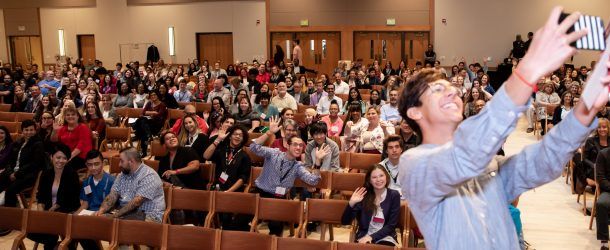Can The Classroom Become A Mystical Place?
Spectrums and Rainbows
My plan was to ask a series of increasingly challenging questions, leading students to an epiphany. I began my lesson on atomic physics by showing a picture of light emitted by mercury atoms then asking for a one-word description of the diagram we were using, stipulating that the word I was thinking of had seven letters. Out of the corner of my eye a student inhaled as if to speak, but she stopped herself. Looking over to her, I offered: “the word you’re thinking of has eight letters. Tell me that word first.”
The student replied: “Spectrum.”
I then asked for a simpler seven-letter word and she said: “Rainbow.”
This is the word I had originally anticipated.
As you might expect, the students stopped thinking about physics and, instead, started asking me how I knew that the student was thinking of a word at all, let alone how I knew the word had eight letters. I explained that, when I teach, I watch students’ faces. I find much of what I need to know there: I see if they are sleepy, enthusiastic, focused, perplexed, or confident. This morning, I saw the student looking quite pensive, then while inhaling to speak, the facial muscles relaxed as if the thinking were over…but all that changed in an instant. Deflated, the pensive face returned. I inferred that the student had a potential solution, then checked it by counting the letters, and realized there were not seven. I know my students tend to make things more complex and intellectual than is often necessary, so I guessed that the rejected word was “spectrum,” with eight letters.
What Partygoers Tell a Physics Teacher
For me, this story demonstrates two things that are essential in education. The first is more theoretical: teaching has not occurred just because I gave an excellent explanation. In fact, teaching has also not occurred if my excellent explanation led to correct ideas in the mind of the learner. Teaching involves a full cycle, in which the teacher inspects what the learner has received and both verifies and affirms that new knowledge. This second part, verifying the understanding of the learner, is often where things break down. I cannot tell you how many times I have attended a party where, upon hearing that I am a physics teacher, another partygoer will tell me what they learned in their physics class. Sadly, most of what I end up hearing is incorrect. While it is possible that the learning faded with time, it’s more likely that the idea that was “learned” in physics class was never correct in the first place, probably because the teacher never deeply checked the student’s understanding.
The second essential demonstrated here is relationship. While I occasionally glance at my notes during a lesson, I primarily focus on my students: I watch them and I listen to them. When they ask questions, I ask them to clarify by elaborating or rewording to ensure I understand, and when I feel like my response is over, I ask if I adequately addressed the question. They learn that I care about them and about what they are thinking, and I learn the kinds of things they wonder about and how they express themselves. It’s common for me to ask a student “ What’s your question? ” before the student has had an opportunity to raise a hand. When they say “ But I didn’t raise my hand ,” I say I knew about their question because of their furrowed brow. Similarly, when I am offering an answer, I often tell a student that I know they now understand, because I saw their facial muscles relax, but that I am going to explain a bit further to ensure that everyone else understands, too.
There is something mystical about teaching. I have an idea in my head, and I not only want to get it into your head, but I also want to ensure that the idea, once transferred, is quite similar to my original idea. In order for this to happen, there must be communication both ways, and that involves trust and relationship.
_____________________________________________
The Deanly Chat
consists of original pieces by Dr. Jeff Ederer and Denise Kupetz Conversations with and stories by professional colleagues who are experts in their field
Conversations with and stories by professional colleagues who are experts in their field Facebook Live events
Facebook Live events Discussion and answers about college admissions and student success (If you have a question you want answered, click here
)
Discussion and answers about college admissions and student success (If you have a question you want answered, click here
) Discussion and editorials about current events in education
Discussion and editorials about current events in education Occasional pieces that don’t fit a prescribed structure.
Occasional pieces that don’t fit a prescribed structure.










